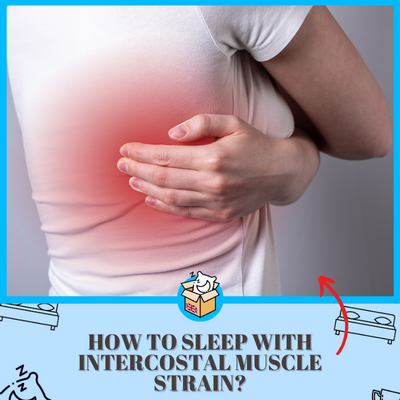Do you have intercostal muscle strain and wonder how to sleep without pain? This post will have it covered! In addition, we will also answer some of the frequently asked questions related to this muscle strain, including:

- What are Intercostal muscle strain and its causes?
- How to get adequate sleep during intercostal muscle pain?
- What is the best sleeping position for intercostal muscle strain?
- How long does it take to heal intercostal muscle strain?
Intercostal muscle strain relates to injury in the muscle between the ribs. It causes pain in the front and back area of the ribs, making it difficult to sleep. Breathing exercises, meditation, and good sleep hygiene are some of the ways to prevent pain while sleeping with an intercostal muscle strain.
What are intercostal muscle strain and its causes?
An injury in the muscle between the ribs is called intercostal muscle strain. These muscles play a crucial role in twisting, respiration, bracing, and other motion types. So, movement will be painful when injured, and sleeping can be pretty challenging.
Now the question is, what causes this intercostal muscle strain? Before we answer that, you should also know that there are three intercostal muscles: innermost intercostal, external, and internal intercostal muscle. Each set has different functions besides the breathing aid.
Some of the everyday activities that cause strain in your rib muscles are:
- Direct hit to rib muscles due to a car accident.
- Excessive stretching or sudden twists.
- Chopping wood
- Participation in sports like tennis, golf, baseball, or rowing.
Some might not be aware that they have an intercostal muscle strain, often leading to the wrong treatment. And if you are having the same issue, these are some of the symptoms of this muscle strain:
- Pain in the chest while sneezing, breathing, or coughing.
- When stretching or twisting, you get pain in the rib cage.
- You will feel tightness at the back or front of the ribs.
- Swelling, muscle tension, and soreness.
These are some of the common symptoms of intercostal muscle strain. While some are minor and heals quickly, some can be a major issue. Hence, it’s essential to consult a physician immediately before it gets worse.
How to get adequate sleep during intercostal muscle strain?
Breathing alone causes massive pain if you have an intercostal muscle strain. And without breathing, one cannot survive. Sadly, we have to live with pain for a specific period. The best way is to consult a doctor and ask for their advice. Depending on your pain level, they will recommend medication or pain relief.
To avoid pain is inevitable; however, there are some steps you can follow to ease the pain. Adequate sleep is necessary for a faster healing process; however, the pain can deny one sleep peacefully.
Given all these issues, here are some tips to get adequate sleep with intercostal muscle strain:
Use sufficient pillows for reclining
Toss and turns are bound to happen while sleeping, which in turn triggers pain. So, to avoid less movement, use cushions or pillows near your sleeping position. The pillows allow you to sleep in a reclined position which prevents movement. And with less tossing, it will cause less strain on the muscle.
Gentle breathing exercise
Breathing becomes difficult when you have an intercostal muscle strain. Initially, this exercise will be pretty difficult because of the strain on the muscle. However, with regular exercise, you will get used to it. Ensure that you breathe gently and not in a harsh way.
This breathing exercise improves your lung capacity, which helps in slowly stretching the strained muscles. Don’t expect instant relief, as it will take time. Follow this routine before going to bed.
Using a compression belt
You can also use a compression belt as a support system for your rib. This additional support will ease the pain in your muscle.
Eat and drink well before sleeping
A sound sleep means not having to wake in the middle of the night, possibly due to hunger. So, ensure that you have a proper dinner before hitting the sack. Additionally, stay hydrated by drinking sufficient water. But avoid drinking when you’re about to sleep, as you might want to pee in the middle of the night.
Follow a proper sleep routine
Sleeping is vital as the healing process takes place during this period. Your body releases a molecule called cytokines, an anti-inflammatory when you sleep. It heals your injuries, and not having a proper sleep routine will cause disruption.
Hence, it’s essential to maintain good sleep hygiene. Reduce screen time and get at least 6-8 hours of sleep, which doctors will always recommend. Without enough sleep, cytokines will not work properly, thus lowering the healing process.
Good mattress
Sleeping is crucial for coping with an intercostal muscle strain. A good and comfortable mattress is necessary to have a sound sleep. Choose a mattress that has spine support or a good body contour. Although this mattress type can be expensive, it is worth the cost. A bad-quality mattress will worsen the injury instead of healing it.
You can follow these measures to get adequate sleep with an intercostal muscle strain. These tips are easy to follow and only require dedication and consistency.
What is the best sleeping position for intercostal muscle strain?
Better sleeping positions reduce pain and prevent constant movement. Sleeping position is essential when you have a muscle strain. A reclined position is mainly recommended for intercostal muscle strain. And for this, you will need pillows to keep you inclined.
Or, you can opt for a recliner chair which is hassle-free and more comfortable. Various recliners are comfortable and come with multiple features. We recommend you use this instead of bed when it’s newly injured. It’s more comfortable and prevents constant movement.
We don’t have a definite answer as to which is the best sleeping position for intercostal muscle strain. Everyone has different sleeping styles and accordingly adjusts to the position. While recline position is often considered for this muscle pain, you can also opt for other options.
For instance, let the injured side be up if you’re a side sleeper. That way, it won’t pressure the muscle strain by your body weight. Furthermore, it will allow stretching in a more comfortable position. Side sleep would be one of the best positions for this type of pain.
For stomach sleepers, additional support is required. You will need a pillow to keep it under your stomach for spine alignment. Furthermore, soft pillows to keep beneath your torso and chest. It will prevent discomfort to your ribs because of the body weight.
How long does it take to heal intercostal muscle strain?
An intercostal muscle strain healing process depends on the severity. It will heal in a few days if it’s a mild injury. There is no specific period for how long it will take to heal.
It mainly depends on how you take care of it. Severe muscle strain will take more than a week. But that doesn’t mean you have to take care. Proper sleep habits, diet, and exercise will heal faster than expected. If you’re inconsistent or pay less heed, the pain will prolong and take time to heal.
This muscle strain can be divided into grade 1, grade 2, and grade 3.
Grade 1: This falls under the mild category, where there is minimal damage to your muscle. It will take around three weeks to heal completely.
Grade 2: Here, the damage is minimal but more severe than in grade 1. The pain will be there, but you can control your movement. The healing process will take over three months or less if proper care is taken.
Grade 3: Grade 3 is when the muscle fibre is damaged severely. Here the muscles are torn, and surgery is required to repair them. It will take a longer time to heal, depending on an individual’s physiology.
It will be better to consult a doctor to know which grade your intercostal strain is. It will help you take care accordingly. Avoid self-medication as it could be dangerous and might worsen the condition. If you feel like you have symptoms of intercostal muscle strain, consult a doctor first and follow their advice.
Be consistent with your physical exercise and follow good sleep hygiene. For this kind of muscle injury, adequate sleep is vital for faster healing.
Conclusion
As we conclude this post, we hope that it was helpful and answered your question. Sleeping can be pretty challenging with an intercostal muscle strain. But with proper measures and steps, you can get adequate sleep. Additionally, breathing exercises, diet, and sleeping habits are necessary to heal faster.
We recommend consulting a doctor first if you have symptoms of this muscle injury. Avoid self-treatment so that you follow the correct procedure. Eventually, it depends on how you take care of it but before you do anything, consult a doctor first.
 Nectar Mattress
Nectar Mattress 


